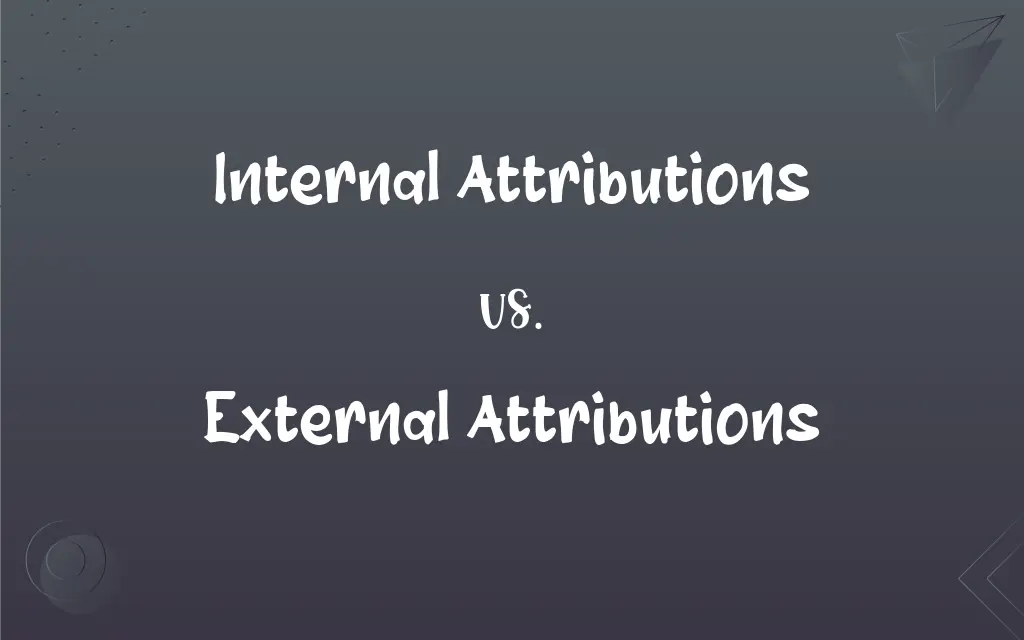Internal Attributions vs. External Attributions: What's the Difference?
Edited by Aimie Carlson || By Janet White || Published on February 27, 2024
Internal attributions assign behavior to personal traits, while external attributions link behavior to situational factors.

Key Differences
Internal attributions are explanations of behavior based on an individual's personality, character, or effort. External attributions, in contrast, are explanations of behavior based on external circumstances or environmental factors.
When someone attributes their success to hard work and intelligence (internal attributions), they are focusing on personal qualities. If they attribute it to luck or easy tasks (external attributions), they are focusing on external circumstances.
Internal attributions are often linked to the concept of control; we believe people control their behavior. External attributions, however, imply that behavior is influenced by factors beyond an individual's control.
Internal attributions can lead to judgments of praise or blame based on the assumption that people are responsible for their actions. External attributions might lead to more empathetic responses, recognizing the role of external circumstances.
Understanding these attribution styles is crucial in psychology, as they affect how people perceive themselves and others, influencing attitudes, motivation, and behavior.
ADVERTISEMENT
Comparison Chart
Focus
Personal traits, abilities, or efforts
Situational factors, environmental influences
Control
Assumes individual control over behavior
Implies behavior influenced by external factors
Examples
Hard work, intelligence, personality traits
Luck, task difficulty, societal influences
Impact on Judgment
Leads to praise or blame
Leads to empathetic or situational understanding
Psychological Implication
Affects self-perception and self-esteem
Influences perception of external circumstances
ADVERTISEMENT
Internal Attributions and External Attributions Definitions
Internal Attributions
Explains behavior through internal personality traits.
Her kindness was attributed to her compassionate nature.
External Attributions
Explains behavior through situational factors.
The crowd's excitement was attributed to the thrilling performance.
Internal Attributions
Links outcomes to personal control.
He attributed his career advancement to his unique skills.
External Attributions
Focuses on environmental influences or luck.
She attributed her missed deadline to unexpected traffic.
Internal Attributions
Focuses on individual effort or ability.
She believed her failure was due to a lack of effort.
External Attributions
Attributing behavior to external circumstances.
The team attributed their loss to the unfavorable weather.
Internal Attributions
Often used to explain consistent behavior over time.
His persistence in challenges was seen as an internal trait.
External Attributions
Links outcomes to factors beyond personal control.
His business failure was attributed to the economic downturn.
Internal Attributions
Attributing behavior to personal characteristics.
He attributed his success in the race to his dedication.
External Attributions
Often used to explain variable behavior across situations.
Her fluctuating performance was attributed to varying levels of support.
FAQs
Can external attributions lead to a victim mentality?
Excessive external attributions might lead to a feeling of helplessness or victimhood.
What are external attributions?
These are explanations of behavior based on situational or environmental factors.
How do internal attributions influence motivation?
They often increase motivation by linking outcomes to personal effort and ability.
What are internal attributions?
They are explanations of behavior based on personal traits or efforts.
Do external attributions play a role in academic settings?
Yes, students often attribute academic success or failure to external factors like teaching quality.
Are internal attributions always positive?
Not necessarily; they can also be negative, attributing failures to personal shortcomings.
How do internal attributions affect self-esteem?
They can significantly impact self-esteem by linking success or failure to personal qualities.
Are external attributions more forgiving in nature?
They can be, as they consider external factors that may be beyond an individual's control.
Can changing attribution styles improve mental health?
Yes, developing healthier attribution styles can improve coping mechanisms and mental well-being.
Why are internal attributions important in sports psychology?
They help athletes associate performance with personal effort and skill, enhancing confidence.
Can a balance of both attributions be beneficial?
A balanced view recognizes both personal effort and environmental influences, leading to a more holistic understanding.
Do external attributions absolve responsibility?
They can shift the focus from personal responsibility to external circumstances.
Can external attributions reduce stress?
Yes, by recognizing factors beyond one's control, they can reduce feelings of stress or guilt.
Are internal attributions more common in individualistic cultures?
Yes, individualistic cultures tend to emphasize personal responsibility and traits.
Do internal attributions relate to the concept of locus of control?
Yes, they are aligned with an internal locus of control, where individuals feel they have control over events.
How do internal attributions affect relationships?
They can strain relationships if one constantly attributes negative outcomes to a partner's character.
Are children taught to make internal attributions?
Children are often encouraged to see effort and attitude as key to success, promoting internal attributions.
How do psychologists assess attribution styles?
Through observations, questionnaires, and discussions about how individuals explain events.
How does culture influence attribution styles?
Cultural norms and values can significantly influence whether people lean towards internal or external attributions.
How do external attributions affect teamwork?
They can encourage empathy and understanding among team members for each other's situations.
About Author
Written by
Janet WhiteJanet White has been an esteemed writer and blogger for Difference Wiki. Holding a Master's degree in Science and Medical Journalism from the prestigious Boston University, she has consistently demonstrated her expertise and passion for her field. When she's not immersed in her work, Janet relishes her time exercising, delving into a good book, and cherishing moments with friends and family.
Edited by
Aimie CarlsonAimie Carlson, holding a master's degree in English literature, is a fervent English language enthusiast. She lends her writing talents to Difference Wiki, a prominent website that specializes in comparisons, offering readers insightful analyses that both captivate and inform.
































































